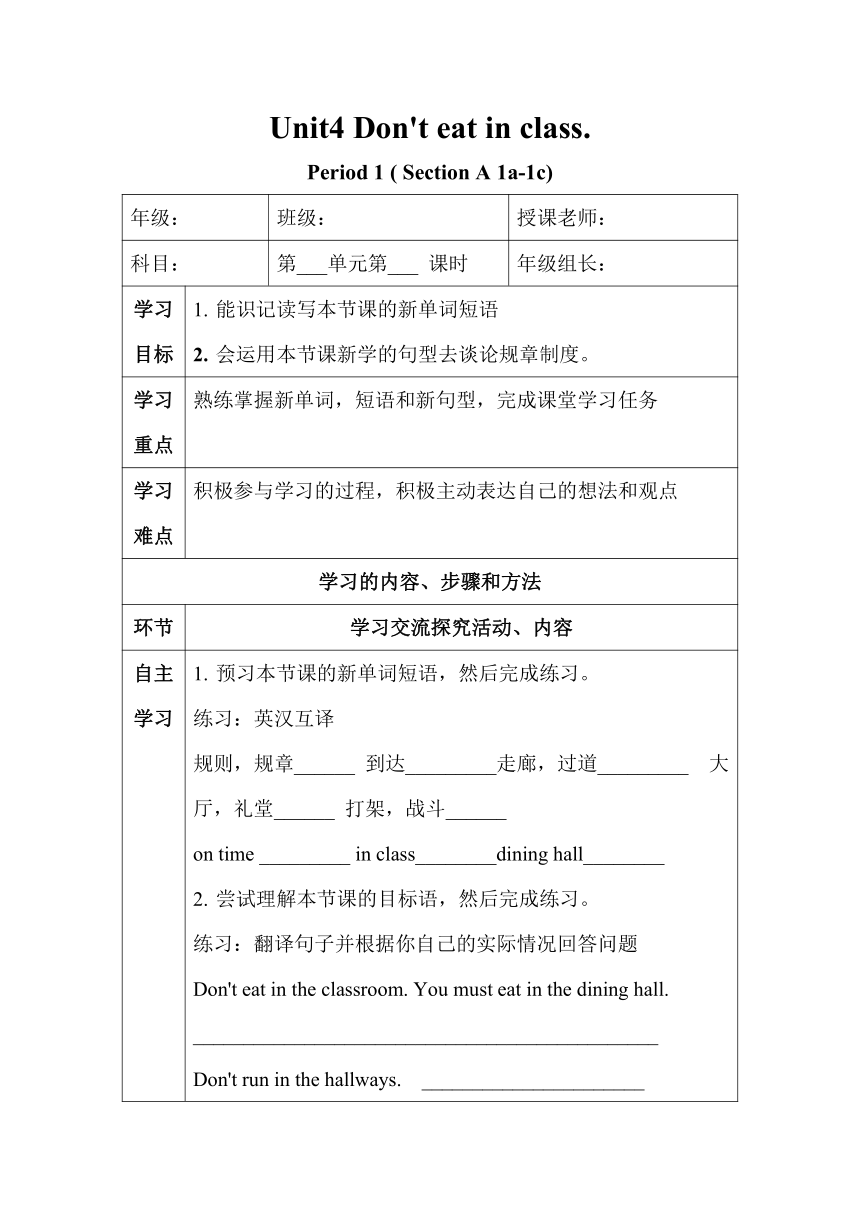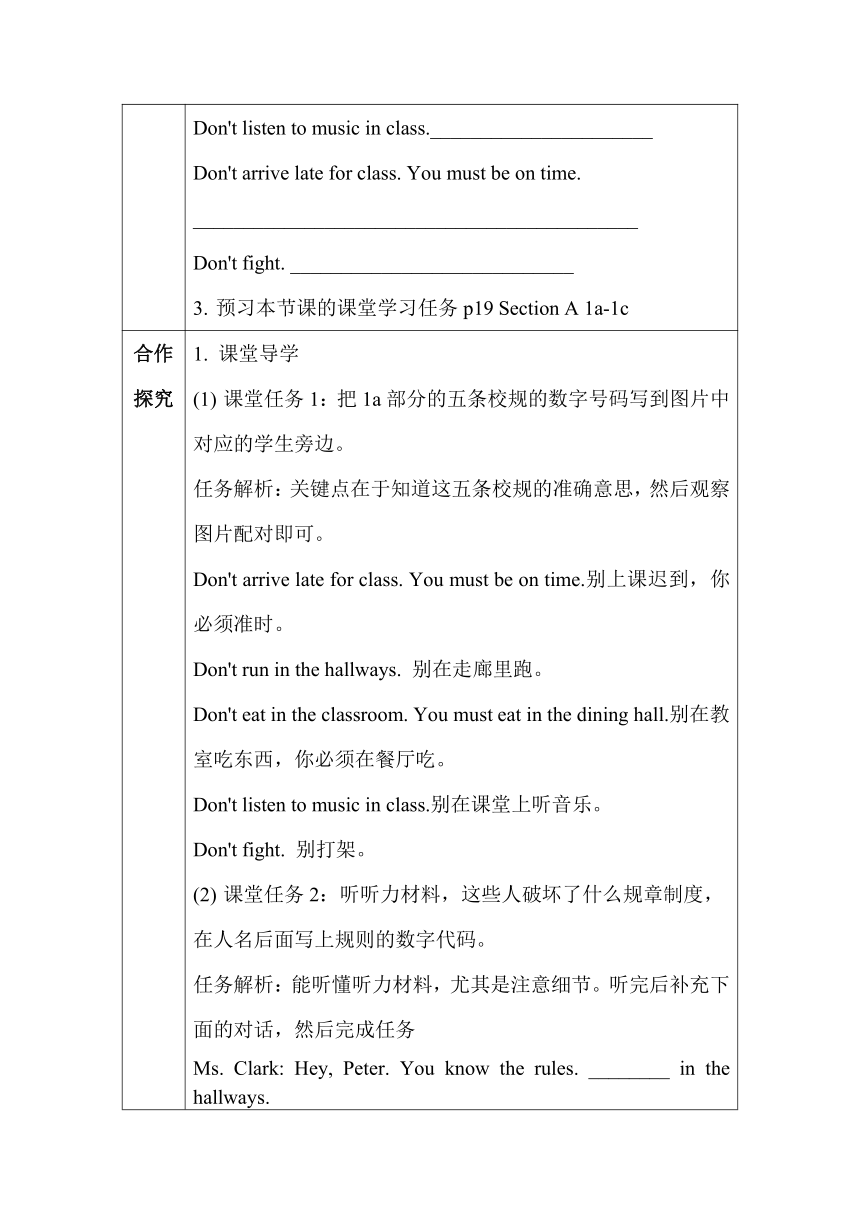Unit 4 Don't eat in class. Section A(1a-1c)学案
文档属性
| 名称 | Unit 4 Don't eat in class. Section A(1a-1c)学案 |

|
|
| 格式 | zip | ||
| 文件大小 | 19.4KB | ||
| 资源类型 | 教案 | ||
| 版本资源 | 人教新目标(Go for it)版 | ||
| 科目 | 英语 | ||
| 更新时间 | 2022-03-23 00:00:00 | ||
图片预览


文档简介
Unit4 Don't eat in class.
Period 1 ( Section A 1a-1c)
年级: 班级: 授课老师:
科目: 第___单元第___ 课时 年级组长:
学习目标 能识记读写本节课的新单词短语 会运用本节课新学的句型去谈论规章制度。
学习重点 熟练掌握新单词,短语和新句型,完成课堂学习任务
学习难点 积极参与学习的过程,积极主动表达自己的想法和观点
学习的内容、步骤和方法
环节 学习交流探究活动、内容
自主学习 预习本节课的新单词短语,然后完成练习。 练习:英汉互译 规则,规章______ 到达_________走廊,过道_________ 大厅,礼堂______ 打架,战斗______ on time _________ in class________dining hall________ 尝试理解本节课的目标语,然后完成练习。 练习:翻译句子并根据你自己的实际情况回答问题 Don't eat in the classroom. You must eat in the dining hall. ______________________________________________ Don't run in the hallways. ______________________ Don't listen to music in class.______________________ Don't arrive late for class. You must be on time. ____________________________________________ Don't fight. ____________________________ 预习本节课的课堂学习任务p19 Section A 1a-1c
合作探究 课堂导学 课堂任务1:把1a部分的五条校规的数字号码写到图片中对应的学生旁边。 任务解析:关键点在于知道这五条校规的准确意思,然后观察图片配对即可。 Don't arrive late for class. You must be on time.别上课迟到,你必须准时。 Don't run in the hallways. 别在走廊里跑。 Don't eat in the classroom. You must eat in the dining hall.别在教室吃东西,你必须在餐厅吃。 Don't listen to music in class.别在课堂上听音乐。 Don't fight. 别打架。 课堂任务2:听听力材料,这些人破坏了什么规章制度,在人名后面写上规则的数字代码。 任务解析:能听懂听力材料,尤其是注意细节。听完后补充下面的对话,然后完成任务 Ms. Clark: Hey, Peter. You know the rules. ________ in the hallways. Peter: Sorry, Ms. Clark. Mr. Smith: Amy, don't eat ____________. You must eat in the dining hall. Amy:Oh, sorry, Mr. Smith. Mr. Smith: Hey, Mike, don't ______________ in class. Mike! Boy:He can't hear you, Mr. Smith. 课堂任务3:根据1a的信息来编对话。 任务解析:识记单词的意思和句型的结构,然后替换练习即可。 S1:What are the rules S2:Well,we can't arrive late for class. We must be on time. 合作交流,问题探讨 问题一,日常生活中除了以上的这些规章制度外,你还见到过哪些规章制度,请尽可能多的列举出来,例如: (1)No parking here. (2)_____________________ (3)_____________________ (4)_____________________ (5)_____________________ (6)_____________________ 问题二,为什么要制定这些规章制度,请尽可能多的说出原因,例如: (1)This behavior is harmful to others. (2)_____________________ (3)_____________________ (4)_____________________ (5)_____________________
展示点拨 知识点1:arrive用法 arrive 意为“到达”后面可以接地点名词或地点副词,接地点名词时要加相应的介词,一般来说arrive in +大地方 arrive at +小地方,接地点副词here/home等不用加介词。 I will arrive in Beijing tomorrow He usually arrive home at 7:50 in the morning. 知识点2: must用法 must 情态动词 意为“必须”,后接动词原型,以must开头的一般疑问句的否定回答不用mustn't,而用needn't或者don't have to,意为“不必” Must we clean the room right now No,we needn't. 知识点3:祈使句 祈使句一般用来表示请求、命令、劝说、警告等,通常省略第二人称主语you。肯定句以动词原形开头,否定句在动词原形前加don't,可以在句前或句后加上please,在句后加要用点号隔开,句前不用点号隔开。 Come in, please. Don't fight. Don't arrive late for class.
测评反馈 完成下面的习练 根据括号中的中文意思用适当的英文单词填空。 They can’t ______(到达)home on time. 2. --Must we clean the bedroom now --No,You_______(不用). 3. Please ____ (听)the teacher carefully. 4. _______(遵守) traffic rules when the traffic light (红绿灯) is red. 翻译下面的句子。 1)上课不要迟到,你必须准时。_____________________________________________________ 2)不要在走廊里跑。_____________________________________________________ 3)不要在教室里吃东西,你必须在餐厅里吃。__________________________________________ 4)不要在课堂上听音乐。_____________________________________________________ 5)不要打架。_____________________________________________________
课后总结
学后记
Period 1 ( Section A 1a-1c)
年级: 班级: 授课老师:
科目: 第___单元第___ 课时 年级组长:
学习目标 能识记读写本节课的新单词短语 会运用本节课新学的句型去谈论规章制度。
学习重点 熟练掌握新单词,短语和新句型,完成课堂学习任务
学习难点 积极参与学习的过程,积极主动表达自己的想法和观点
学习的内容、步骤和方法
环节 学习交流探究活动、内容
自主学习 预习本节课的新单词短语,然后完成练习。 练习:英汉互译 规则,规章______ 到达_________走廊,过道_________ 大厅,礼堂______ 打架,战斗______ on time _________ in class________dining hall________ 尝试理解本节课的目标语,然后完成练习。 练习:翻译句子并根据你自己的实际情况回答问题 Don't eat in the classroom. You must eat in the dining hall. ______________________________________________ Don't run in the hallways. ______________________ Don't listen to music in class.______________________ Don't arrive late for class. You must be on time. ____________________________________________ Don't fight. ____________________________ 预习本节课的课堂学习任务p19 Section A 1a-1c
合作探究 课堂导学 课堂任务1:把1a部分的五条校规的数字号码写到图片中对应的学生旁边。 任务解析:关键点在于知道这五条校规的准确意思,然后观察图片配对即可。 Don't arrive late for class. You must be on time.别上课迟到,你必须准时。 Don't run in the hallways. 别在走廊里跑。 Don't eat in the classroom. You must eat in the dining hall.别在教室吃东西,你必须在餐厅吃。 Don't listen to music in class.别在课堂上听音乐。 Don't fight. 别打架。 课堂任务2:听听力材料,这些人破坏了什么规章制度,在人名后面写上规则的数字代码。 任务解析:能听懂听力材料,尤其是注意细节。听完后补充下面的对话,然后完成任务 Ms. Clark: Hey, Peter. You know the rules. ________ in the hallways. Peter: Sorry, Ms. Clark. Mr. Smith: Amy, don't eat ____________. You must eat in the dining hall. Amy:Oh, sorry, Mr. Smith. Mr. Smith: Hey, Mike, don't ______________ in class. Mike! Boy:He can't hear you, Mr. Smith. 课堂任务3:根据1a的信息来编对话。 任务解析:识记单词的意思和句型的结构,然后替换练习即可。 S1:What are the rules S2:Well,we can't arrive late for class. We must be on time. 合作交流,问题探讨 问题一,日常生活中除了以上的这些规章制度外,你还见到过哪些规章制度,请尽可能多的列举出来,例如: (1)No parking here. (2)_____________________ (3)_____________________ (4)_____________________ (5)_____________________ (6)_____________________ 问题二,为什么要制定这些规章制度,请尽可能多的说出原因,例如: (1)This behavior is harmful to others. (2)_____________________ (3)_____________________ (4)_____________________ (5)_____________________
展示点拨 知识点1:arrive用法 arrive 意为“到达”后面可以接地点名词或地点副词,接地点名词时要加相应的介词,一般来说arrive in +大地方 arrive at +小地方,接地点副词here/home等不用加介词。 I will arrive in Beijing tomorrow He usually arrive home at 7:50 in the morning. 知识点2: must用法 must 情态动词 意为“必须”,后接动词原型,以must开头的一般疑问句的否定回答不用mustn't,而用needn't或者don't have to,意为“不必” Must we clean the room right now No,we needn't. 知识点3:祈使句 祈使句一般用来表示请求、命令、劝说、警告等,通常省略第二人称主语you。肯定句以动词原形开头,否定句在动词原形前加don't,可以在句前或句后加上please,在句后加要用点号隔开,句前不用点号隔开。 Come in, please. Don't fight. Don't arrive late for class.
测评反馈 完成下面的习练 根据括号中的中文意思用适当的英文单词填空。 They can’t ______(到达)home on time. 2. --Must we clean the bedroom now --No,You_______(不用). 3. Please ____ (听)the teacher carefully. 4. _______(遵守) traffic rules when the traffic light (红绿灯) is red. 翻译下面的句子。 1)上课不要迟到,你必须准时。_____________________________________________________ 2)不要在走廊里跑。_____________________________________________________ 3)不要在教室里吃东西,你必须在餐厅里吃。__________________________________________ 4)不要在课堂上听音乐。_____________________________________________________ 5)不要打架。_____________________________________________________
课后总结
学后记
同课章节目录
- Unit 1 Can you play the guitar?
- Section A
- Section B
- Unit 2 What time do you go to school?
- Section A
- Section B
- Unit 3 How do you get to school?
- Section A
- Section B
- Unit 4 Don't eat in class.
- Section A
- Section B
- Unit 5 Why do you like pandas?
- Section A
- Section B
- Unit 6 I'm watching TV.
- Section A
- Section B
- Review of Units 1-6
- Unit 7 It's raining!
- Section A
- Section B
- Unit 8 Is there a post office near here?
- Section A
- Section B
- Unit 9 What does he look like?
- Section A
- Section B
- Unit 10 I'd like some noodles.
- Section A
- Section B
- Unit 11 How was your school trip?
- Section A
- Section B
- Unit 12 What did you do last weekend?
- Section A
- Section B
